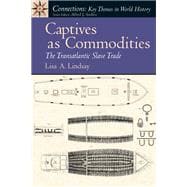
Note: Supplemental materials are not guaranteed with Rental or Used book purchases.
Purchase Benefits
What is included with this book?
| Foreword | p. viii |
| Series Editor's Preface | p. x |
| About the Author | p. xv |
| Acknowledgments | p. xvi |
| Introduction | p. 1 |
| The Slave Trade and the Western World | p. 1 |
| Ways of Studying the Slave Trade | p. 2 |
| Overview of the Atlantic Slave Trade | p. 4 |
| Connections | p. 9 |
| The Old World Background to New World Slavery | p. 10 |
| The Maritime Revolution and European Trade with Africa | p. 14 |
| Why Did Europeans Buy African Slaves? | p. 22 |
| Origins: Economics or Racism? | p. 22 |
| Early Labor Demand in the New World | p. 24 |
| Northern Europeans and the Expansion of the Slave Trade | p. 30 |
| The 18th-century Peak of the Slave Trade | p. 34 |
| Slavery and Racism | p. 41 |
| Conclusion | p. 47 |
| Sources | p. 48 |
| Why Did Africans Sell Slaves? | p. 54 |
| Common Myths | p. 54 |
| General Interpretations | p. 55 |
| The Slave Trade, Wealth, and Power in Africa | p. 57 |
| The First Two Centuries of Transatlantic Slave Exports from Africa | p. 61 |
| Expansion of the Trade | p. 65 |
| Effects of the Slave Trade on Africa | p. 74 |
| Conclusion | p. 77 |
| Sources | p. 78 |
| How Did Enslaved People Cope? | p. 84 |
| The Henrietta Marie | p. 84 |
| Passages on Land | p. 86 |
| Passages at Sea | p. 89 |
| African Cultures in the New World | p. 96 |
| Conclusion | p. 104 |
| Sources | p. 106 |
| How Did the Slave Trade End? | p. 112 |
| A Skeptical Query | p. 112 |
| Profits and the Slave Trade | p. 113 |
| Ideology and Revolution | p. 114 |
| Antislavery in the United Kingdom | p. 118 |
| Revolution in St. Domingue | p. 123 |
| Final Slave Trade Abolition | p. 128 |
| What Explains British Antislavery? | p. 132 |
| Conclusion | p. 134 |
| Sources | p. 136 |
| Epilogue: Making Connections-Legacies of the Atlantic Slave Trade | p. 142 |
| The Slave Trade in Modern Memory | p. 142 |
| Africa | p. 144 |
| Great Britain | p. 147 |
| The Americas | p. 149 |
| Racism in the Americas | p. 160 |
| Slavery in the Contemporary World | p. 162 |
| The Big Lessons | p. 163 |
| Bibliography | p. 165 |
| Index | p. 171 |
| Table of Contents provided by Ingram. All Rights Reserved. |
The New copy of this book will include any supplemental materials advertised. Please check the title of the book to determine if it should include any access cards, study guides, lab manuals, CDs, etc.
The Used, Rental and eBook copies of this book are not guaranteed to include any supplemental materials. Typically, only the book itself is included. This is true even if the title states it includes any access cards, study guides, lab manuals, CDs, etc.